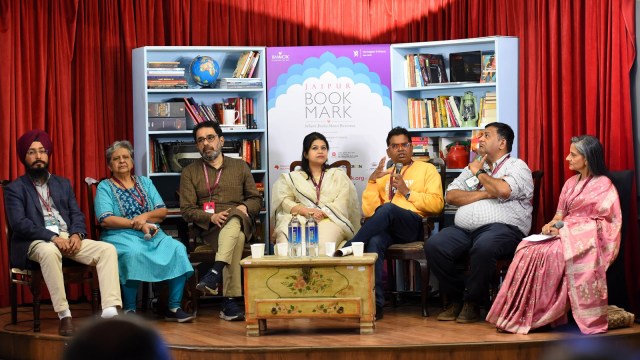JLF 2024: “Telugu literature is in the pits”: Gita Ramaswamy, publisher
Spread of English-medium schools and less instruction in the mother tongue have led to a decrease in reading the language for pleasure, according to Ramaswamy
 Day three of Jaipur Literature Festival 2024. (Source: Rohit Jain)
Day three of Jaipur Literature Festival 2024. (Source: Rohit Jain)Painting a dismal picture of contemporary Telugu literature, publisher Gita Ramaswamy, who co-founded the famed Hyderabad Book Trust in 1980, said that lack of interest in the language, low-quality education in English-medium government schools, and the communist and women’s movements of the 1970s, have cast a shadow on the language’s publishing landscape.
“Mine is not a success story. I’m amazed at the strides other languages have made. Telugu literature is in the pits right now. I don’t know where the issue lies. Maybe it’s because erstwhile Andhra Pradesh has roots in the early communist and Naxalite movements, which cast their shadows over literature, as did the feminist and Dalit movements. Everyone was looking behind their shoulders while writing. All government schooling in Telugu states is now in English, but teachers don’t know it, and students have forgotten how to read and write in their mother tongue. The only thing keeping Telugu alive is the film industry,” she said, adding that her company is now translating works to English to promote readership.
She was speaking on day three of Jaipur Literature Festival 2024, in conversation with literary agent Mita Kapur and a panel of publishers from various Indian languages: Shailesh Bharatwasi of Hind Yugm (Hindi); Kannan Sundaram of Kalachuvadu (Tamil), Esha Chatterjee of BEE Books (Bengali); Parminder Singh Shonkey of Rethink Books (Punjabi) and Ravi Deecee of DC Books (Malayalam).
Bharatwasi agreed that the communist and women’s movements had caused a censorship of sorts, with Hindi writers often labelled ‘bourgeois’. “Some of our books have sold in lakhs but the future is scary. I came into Hindi publishing because I studied in the language up till 12th standard. The connection you develop by studying subjects in your language cannot be beaten by someone who studies it separately. In Hindi-speaking areas, even in the lower-middle class, there aren’t many who study in Hindi. English-medium schools have opened. There’s no reason to read that literature,” he said.
Malayalam, Tamil and Bengali have had a different experience, however.
Deecee said, “In recent years, Malayalam cinema and writing are being accepted across India and elsewhere. A lot of new writers are coming up. 10 years back, only writers who wrote up to the 1970s were bestsellers. But now, debut writers have taken the front-seat, selling more than 15,000 to 20,000 copies a year. Three of the last five JCB prizes have been won by Malayalam books. We’re now even revisiting classical books.”
Sundaram said, “Our challenges may be similar – more and more English schools – but our solutions local. In the 1990s, we were economically liberalised and there was a huge technological revolution. In Tamil, there was a huge women’s writing movement. With Ambedkar’s centenary, Dalit women also joined it. They have now taken writing beyond the literary circle.”
Chatterjee said, “In Bengali, if there’s anything too authoritative, there are always writers willing to write anti-establishment books. During the communist movement, we saw writers like Sunil Gangopadhyay come up. Bengalis like reading anti-establishment books, and in both Bengali and English. We’re not competing with English publishers as what’s published in both languages is very different. We do translations to spread Bengali literature because, with time, people want to return to their own language. And Bangladesh deserves huge credit for keeping the language alive.”
Shonkey said, “With Indian languages, it’s difficult to know the readership. In Punjabi, for the last few years, the worst books are selling the most, and the good ones get lost. A book that no critic liked and was panned on social media is selling in the black market. Moreover, with an ideological movement, people may buy a popular book but not actually read it.”
Audiobooks were suggested as a way out. In response to a question about whether English-medium education is preferable for service sector employment in India, Manisha Chaudhry of Manan Books pointed to studies that conclude children’s learning outcomes improve with instruction in the mother tongue.
Photos



- 01
- 02
- 03
- 04
- 05




























